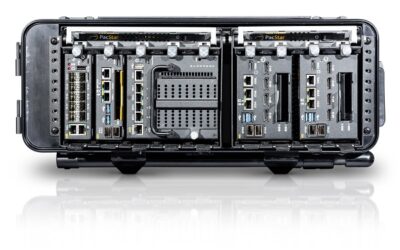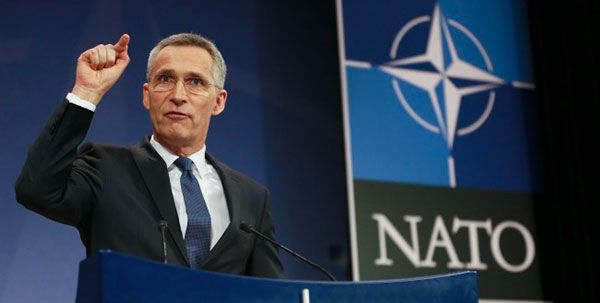Jeffrey Eggers – ‘The Multi-generational Challenge is on Everybody’s Mind’
One of the purposes of the Words on Wednesday column is to seek alternative viewpoints; to mine the rich vein of experience, knowledge and insight that exists on the periphery of our modelling and simulation community; to inspire thought leadership and debate – even controversy. No stone is too cumbersome to leave unturned in the search for nuggets of truth or nodules of true gold and no path too overgrown to follow. Hence, we will see people from unexpected directions appear in the column over time.
Our segment of the defence world is heavily populated with ex-military folks – and that is entirely to be expected and A Good Thing, in many respects. Not all former soldiers, sailors, marines or airmen and women, however, gravitate to the defence industry per se, some preferring, instead, to leverage their experience, knowledge and skillsets to alternative ends.
Jeff Eggers, Executive Director of the McChrystal Group Leadership Institute and a former US Navy SEAL, is just such an individual. Highlights of his distinguished career include periods as Special Assistant to the Chairman of the Joint Chiefs and as Special Assistant to the President for National Security Affairs. With a bachelor’s degree from the US Naval Academy and a master’s from Oxford University, Mr Eggers now leads research and the training of private and public sector clients in leadership behaviour and organisational performance. He is co-author of Leaders: Myth and Reality with General Stanley McChrystal and Jason Mangone and, graciously, recently shared his views with MTSC on a range of issues from the ‘multi-generation challenge’ to the Arab Spring.
MTSC: Leadership at a lower and lower level of command is becoming ever more important – General Kulak’s ‘Strategic Corporal’ concept. Is that myth or reality? How effectively have we responded to the implied challenge?
JE: In a way, I’m not certain the ‘strategic corporal’ is entirely real. The issue is less about the corporal and more about the environment – the environment in which both the corporal and the four-star general operate has changed. The increased efficacy of junior people would seem to me to have more to do with the information age – what we are now calling the Fourth Industrial Age – and the consequently greater incidence on non-linearity.
Not only is the environment becoming more complex, but the rate at which it is doing so is accelerating, too. That inevitably means we seek more leverage, to achieve strategic benefits from tactical actions and to engineer larger outcomes from smaller perturbations. But this is scarcely a new issue.
The onset of the First World War, at least as far as US involvement was concerned, stemmed from a chauffeur taking the wrong turn: an assassin’s bullet became the spark that ignited the tinder that fired the kindling that lit a fire that spread around the world. So, there is some reality in the belief that minor actions can have major effects – the concept underlying the ‘strategic corporal.’
But there is another point of view – recently discussed at length in Barbara Kellerman’s The End of Leadership – disruption of the hierarchical command chain. As authority devolves to – and begins to be exercised at – a lower level, the realisation sets in that authority derives from information – not from position. The Arab Spring provides a brilliant example of that devolution in action – catalysed through social media – that’s the reality. Admittedly, unforeseen consequences led to the increased prominence of the Muslim Brotherhood and, ultimately, a military coup. But that doesn’t alter the importance of what happened.
The issue centres on humanity. There is a strong argument that we are fundamentally predisposed to fall back into hierarchical norms – that we don’t actually like usurping or assuming authority in non-traditional ways. For all the arguments about artificial intelligence and robotics, we are still human. Until we change our mindsets with regard to decision-making, full realisation of the ‘strategic corporal’ concept seems unlikely. There is some reality to it, but it has been greatly over-hyped – a long answer to a complex question.
MTSC: That is a great segué into the question of generational differences. We talk a lot about training upcoming generations for command and ensuring we meet their expectations in terms of fidelity in training simulations, for example. Are we succeeding or are we letting the next generation down?
JE: It is certainly the case that the multi-generational challenge is on everybody’s mind. We talk about the Nintendo generation, about millennials – but we need to remind ourselves the spectrum includes the more mature generations too. The viewpoint seems to have been, largely, that the spectrum is associated with technological influences and is somehow characterised as adversarial, with technology solutions ignoring the way we think, the way we learn. Reality, however, is somewhat different, I think: technology is catching up with the way humans have always learned – which is experiential, not presentational. We learn by doing or experiencing – not by being told. Technology has the potential to unlock improvements and advantages – there is a huge amount of upside potential in this and that is certainly the case in the military context.
The lesson, though, is an important one. What we do now will impact the way in which this next generation trains and influences its next generations. The current generation is desirous of authority – even expects it – because they have become accustomed to it at an earlier age. That means the style of leadership for the future will inevitably change – if we can evolve.
Ideas of empowerment and its benefits have been around for decades. There is a natural human resistance to it, since it implies loss of control, feels threatening and calls individual relevance to be questioned: that is our human cognitive wiring at work. So, it requires a great deal of deliberate diligence to make empowerment work – that’s what we all need to work towards. Is there heightened risk? Sure – and the returns are longer term too, which is why this requires a leap of faith.
MTSC: Putting the individual back at the focus of training solutions has been a mantra in the military for a decade. Are we delivering on that undertaking – and are we reaping the benefits?
JE: There is growing awareness that being human-centric in the development of training regimes is beneficial – and I think that is very healthy. I testified to the (US Senate) Armed Services Committee on this several years ago, since it seems to me that what the services require is an ability to promote adaptability. What we have tended to do is to conflate innovation and adaptability, somehow deciding that it is technology – especially new and emerging technology – that empowers it. But the ‘system’ doesn’t become more adaptable because of technology – it does so because of changes in the way people think.
The stumbling block is there is an operational mindset in military society – pilots fly aircraft, dismounted soldiers winkle adversaries out of foxholes, etc. The truth is that we are on the verge of another Revolution in Military Affairs, in which we need to address some of the understandings and misunderstandings that abound in our discussions. Many commentators see technology – specifically robotics – as somehow diminishing the human being – making him or her less relevant. It is imperative to put the human being back where he or she belongs – on top. Learning differently, adapting more readily, sharing decision-making and shouldering responsibility. That is happening: and I am very happy that is the case.
MTSC: Thank you.
























